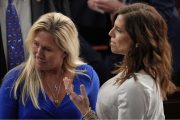
In a significant political move, Elon Musk has committed $45 million a month to a new super political action committee (PAC) named “America PAC,” aimed at supporting former President Donald Trump, as reported by the Wall Street Journal on Monday. This substantial financial backing is intended to counter Democratic “get out the vote” (GOTV) campaigns in critical swing states, making it a pivotal development in the upcoming election landscape. Musk’s former and current business partners of the so-called “PayPal Mafia” are also backing Trump, per the report.
The report coincided with the first day of the Republican National Convention in Milwaukee, where Trump secured the Republican nomination for president.
America PAC’s Strategic Focus
America PAC’s primary mission is to boost voter registration and encourage early voting and mail-in ballots across key swing states. The super PAC is not only backed by Musk but also by influential figures such as Palantir Technologies co-founder Joe Lonsdale; Cameron and Tyler Winklevoss; and former U.S. ambassador to Canada Kelly Craft and her husband, Joe Craft, CEO of Alliance Resource Partners. This high-profile support underscores the super PAC’s significant financial muscle and its potential to shape electoral outcomes by beating the Democrats with their own weapons — mail-in ballots and early voting, among other tools.
According to the WSJ report,
Formed in June, America PAC is focused on registering voters and persuading constituents to vote early and request mail-in ballots in swing states, according to one of the people. The coalition assessed that the Democrats have historically had very robust “get out the vote” campaigns and took note of the amounts of money that the Biden administration has dedicated to so-called on the ground efforts in swing states. America PAC will try to counter that.
The group’s efforts are focused on battleground states that could determine the next president. By leveraging extensive data analytics and targeted campaigning, America PAC aims to identify and mobilize voters who are likely to support Trump. This includes not only traditional Republican voters but also independents and disaffected Democrats. The PAC’s strategy involves sophisticated digital campaigns, ground operations to register new voters, and initiatives to ensure high turnout among Trump supporters.
According to WSJ, America PAC received $8.75 million in contributions for the quarter ending June 30. While Musk’s donations are expected to commence this month, a recent Bloomberg News report indicated that Musk had already contributed last week, although the amount was not specified.
Musk’s Endorsement and Political Shift
Following the failed assassination attempt on Trump, Musk expressed his support on X, stating, “I fully endorse President Trump and hope for his rapid recovery,” and comparing Trump to Theodore Roosevelt in terms of toughness.
Musk’s endorsement marks a significant shift from his previous political affiliations, notably highlighted by the popular X account “End Wokeness,” which pointed out Musk’s transition from an Obama voter to a substantial supporter of Trump.
This shift in Musk’s political alignment can be traced to several factors. His growing disenchantment with certain Democratic policies, particularly those impacting the tech industry and business regulations, has driven him closer to the Republican camp. Musk’s apparent advocacy for free speech, reduced regulation, and innovation aligns closely with the policies promoted by Trump and his supporters.
Other observers explain Musk’s evolution by simple business opportunism rather than by his genuine acceptance of conservative values (see here and here).
Yet, undoubtedly, by backing Trump, Musk is positioning himself as a key influencer in the mainstream conservative movement, leveraging his substantial social media following and business acumen to drive political discourse.
Musk and X as an “Everything App”
It’s worth noting that Musk’s ambitions for X raise alarms.
Elon Musk has been vocal about his ambition to transform Twitter, now rebranded as X, into an “everything app” similar to China’s WeChat. WeChat, developed by Chinese tech giant Tencent, is a highly integrated platform used by more than a billion people for various services, including messaging, payments, social media, and even government services, and which feeds into the China’s social credit system.
Musk’s vision for X is to create a similar ecosystem that can open the door to sweeping government surveillance and control. This is particularly troubling in the context of Musk’s extensive ties to the government and his involvement in an ongoing censorship on X.
Praise for J.D. Vance and the “PayPal Mafia” Influence
Musk also praised Trump’s selection of J.D. Vance as his vice presidential nominee, calling it an “excellent” choice.
Vance’s connection to Peter Thiel (whose generous donations ensured his successful senatorial campaign in 2016), a co-founder of Palantir Technologies, underscores the deep ties between prominent tech entrepreneurs and the Trump campaign.
David Sacks, another key figure mentioned in the WSJ article, has also shown support for Trump by hosting a major fundraiser at his San Francisco mansion. This network of influential tech figures, often referred to as the “PayPal Mafia,” includes Musk, Thiel, and Sacks, all of whom have leveraged their Silicon Valley success into significant political influence.
The “PayPal Mafia,” a group of former PayPal executives and employees who have gone on to create and fund some of the most successful U.S. tech companies, wields considerable power in both the business and political arenas. Their collective support for Trump signals a broader shift within Silicon Valley, traditionally a Democratic stronghold, towards an apparently more balanced political engagement. This coalition’s financial resources and strategic insights could prove decisive in the upcoming elections, amplifying Trump’s campaign efforts and yet making him indebted to help promote their agenda.
Musk and the Government
Elon Musk’s involvement in politics is not limited to financial contributions.
The world’s richest person and an eccentric entrepreneur who often lambasts government intervention, Musk has benefited immensely from taxpayer money. According to a 2015 Government Technology report, Musk’s business empire has thrived on $4.9 billion in government subsidies — which came in various forms including grants, tax breaks, discounted loans, and environmental credits — that have been crucial for the growth of Tesla, SpaceX, and SolarCity, a solar-panel manufacturer acquired by Tesla in 2016.
Additionally, SpaceX and Tesla have been integral to numerous government projects, including those with the Department of Defense (particularly the U.S. Air Force) and NASA, leading to various subsidies and multi-million-dollar contracts over the years.
Musk is also a climate-change alarmist, viewing Tesla’s advancements in electric vehicles and battery storage as crucial instruments in the clean-energy revolution. These developments align seamlessly with the government’s climate-change agenda, pushing the energy transition away from fossil fuels — and prosperity for most people.
Finally, while there are no known contracts between Musk’s tech company Neuralink and the U.S. military, the latter has been actively exploring the potential use of brain-computer interfaces (BCIs), similar to those developed by Neuralink, for military use. These applications could include enhanced communication, control of unmanned systems, and improving cognitive abilities of soldiers.
Palantir and U.S. Intelligence
Besides Musk’s extensive ties with the government, a troubling connection between the administrative state, often referred to as the Deep State, and Trump’s campaign is the influence exerted by Peter Thiel, who plays a significant role in shaping Trump’s political strategy and who served on Trump’s transition team in 2016 and has remained his donor over the years.
Thiel’s Palantir Technologies, which mainstream media has recognized for years as an “all-seeing eye” that knows “everything about you,” is deeply involved in U.S. intelligence operations at home and abroad.
Palantir provides advanced data-analysis tools used by numerous government agencies, including the CIA, FBI, and the Department of Defense. The company’s flagship software platforms, such as Gotham and Foundry, enable intelligence agencies to analyze vast amounts of data quickly and efficiently. While these tools are touted as instrumental in uncovering terrorist networks, preventing cyberattacks, and enhancing military operations, they also pave the way for digital surveillance over everyday people, predictive policing, invasive public health surveillance, and other elements of the totalitarian state.
The alarm was raised, among others, by investigative journalist Whitney Webb of Unlimited Hangout.
“Peter Thiel has been working [with] US intelligence for decades to privatize many of its worst projects and ops. Companies he cofounded and funds are at the heart of the surveillance police state/war on domestic terror to come. Why won’t more in alt media expose him?” she posted.
Webb added that Thiel funds “most” of the alternative media companies, implying that no critical reporting on these pressing issues is expected.





